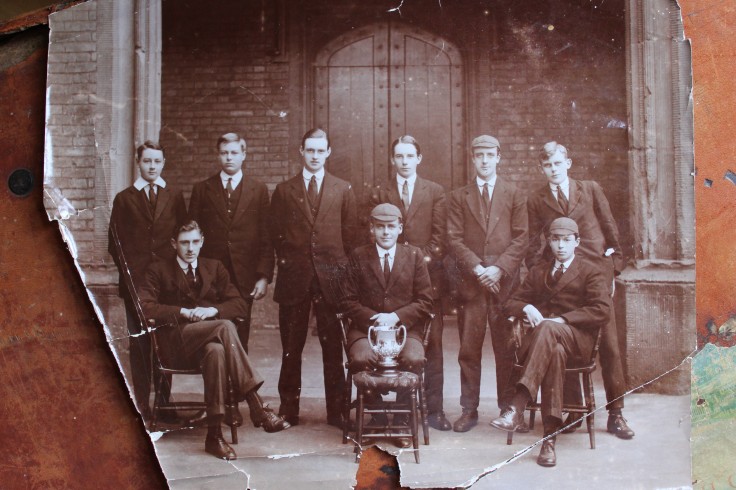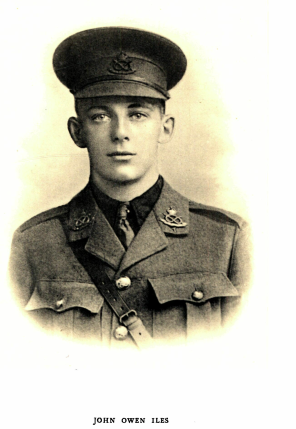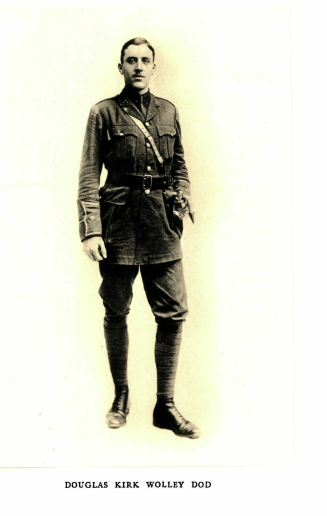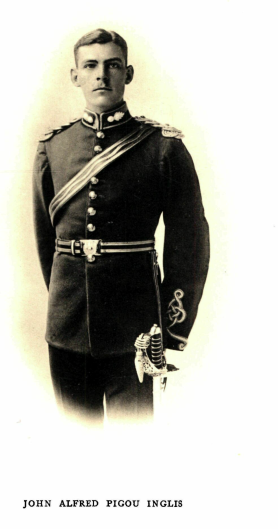
The Trinity (Summer) Term of 1915 was to be Louis’ penultimate at Rugby. His father and Dr David had agreed that he would work hard for a Cambridge scholarship and apply for a temporary commission as it appeared that the war would drag on for some time to come. The names of Old Rugbeians who had been killed continued to arrive, including more and more of Louis’ friends from School House, and their horrified families arrived each term to attend the memorial services that must have been a sobering experience for the boys still at the school. On the 13th of November 1915 Louis wrote:
‘We had a memorial service yesterday for the boys killed between now and June 20th. Many names. It was sad to see the sad fathers and mothers. In this week’s Illustrated News, in the right hand bottom corner of the page of killed officers you will see three Rugby boys together – all here with me – Inglis, Wolley-Dod and Iles – the last two in S.H.’
Louis wrote that exactly a year to the day before he too would die. Iles had been a School House Sixth, and Wolley-Dod a member of the champion school shooting team of 1914. All three are shown below.

School life stuck as closely as possible to the pre-war routines, and food shortages perhaps has less of an effect on the notoriously spartan Rugby ‘stodge’ than elsewhere. Cricket reigned supreme on the Close and, to Louis’ delight, he took several wickets in the School House campaign to win the house competition. Louis is on the right in the team photo above, seemingly worried that he would be out of the shot, but instantly recognisable by his ears and deep-set eyes.
He knew that this would be the last summer of his school career. Boys joined and left the school every term at the time, not just in September and June as they do today, and so as summer turned to autumn Louis’ conversations with Dr David turned to his choice of service. There was no real history of military service in his family, beyond his grandfather’s colonelcy of a Yeomanry regiment, and Louis’ father was actively opposed to such a career, so there was no well-trodden path to follow. Consequently, during an evening chat in the Headmaster’s study, Dr David suggested the Royal Marines, as Louis would have the choice of serving at sea or ashore, and he readily  agreed to what sounded like an exciting proposal. His last term was one of hard work for the Cambridge exam, and he received a good, if sparse, reference from Dr David, but the ever-present nature of the war meant that Louis could not avoid thinking about what was to come. In late November 1915 he wrote:
agreed to what sounded like an exciting proposal. His last term was one of hard work for the Cambridge exam, and he received a good, if sparse, reference from Dr David, but the ever-present nature of the war meant that Louis could not avoid thinking about what was to come. In late November 1915 he wrote:
‘There was a boy down here to see us last week who was here in the house this time last year. Since then he has been to Flanders and wounded and is back. He had some disgusting tales to tell, and exciting ones. Some fo our trenches – being old German ones – have communication trenches that lead forward into the present German trenches. One day this boy turned down one of these trenches and saw two rifles at the far end trained on him. He went down like a shot in the mud – the next second two bullets passed over his head. He lay not daring to move for about half an hour. They pulled the trigger of these rifles with string from round the corner. When he did at last venture to get up he found he was stuck in the mud – and it was with great difficulty that he got out. He says many soldiers are drowned in mud in this way as they drop down in the mud, wounded, and sink in and their wound is too painful for them to struggle out. Various other stories he had – not very suitable for writing down.’
 Both Louis and his parents can’t have helped but imagine him in just as terrifying a situation, as he soon would be.
Both Louis and his parents can’t have helped but imagine him in just as terrifying a situation, as he soon would be.

Leave a comment